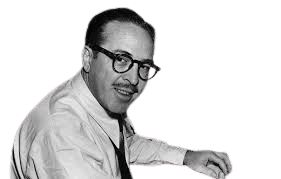Life and achievements
Early life
Dalton Trumbo was born on December 9, 1905, in Montrose, Colorado, but his family moved to Grand Junction when he was young. His family relocated to California in 1924, and Trumbo joined the University of Southern California, after which he joined the workforce at night to fend for his family.
Nevertheless, the challenges that Trumbo faced helped him discover his passion for writing, and while in college, he wrote for college newspapers and magazines and worked on short stories. His hard work was rewarded with the position of managing editor of The Hollywood Spectator and also as a story editor of the Warner Brothers company. His first novel, Eclipse, which was published in 1935, depicted the hardship of small-town Americans during the Depression, and this was the forerunner of the political and social themes that characterized his other works.
Trumbo's early success in screenwriting began in the late 1930s with films such as A Man to Remember and Kitty Foyle (1940), the latter of which brought Trumbo his first Academy Award nomination. His anti-war novel, Johnny Got His Gun (1939), narrated the story of a disabled soldier in World War I and was a National Book Award winner and one of the author's most famous works. The novel's success paved the way for Trumbo as a renowned author and writer in Hollywood; he was one of the most paid screenwriters in the 1940s.
Legacy
Dalton Trumbo's position as one of the most talented and renowned screenwriters in the American cinematographic industry is still undeniable, along with his role as the figure of the oppressed individual who fights against injustice and tyranny.
The fact that his movies remain popular and acclaimed, from Roman Holiday to Spartacus, shows that he was a great filmmaker; his fight against the Hollywood blacklist shows that he was a man of integrity as well. Trumbo's decision not to testify before the Committee during the Red Scare and his decision to continue to work secretly were helpful in the exposure of the hopelessness and unfairness of the blocklist and played a part in dismantling it.
Trumbo believed that free speech must be fought for at any cost, and this has echoed throughout his career. Some of his roles included rebels, outsiders, and freedom fighters, as seen in Spartacus and Exodus, which were confirmed in his life. Despite his ordeals, Trumbo never relented on his passion and remained a prolific writer of compelling and socially conscious scripts. This struggle was redeemed when he was later awarded by the Writers Guild of America and the Academy Awards to confirm his place in Hollywood history. After his death, his life was documented in biographies, documentaries, and in the 2015 film Trumbo, so that his work in both film and free speech was remembered.
Milestone moments
Oct 20, 1947
Blacklisted by Hollywood
In October 1947, Dalton Trumbo was among the film industry people asked to appear before the House of Un-American Activities Committee. When asked about his political affiliations, Trumbo denied membership in the CPUSA and thus was blacklisted from Hollywood, therefore ceasing his work as a credited screenwriter.
This was in defiance of the House Un-American Activities Committee, which Trumbo and the other members of the Hollywood Ten did to bring about a change in their lives. He would have to publish under pseudonyms for the next ten years, but his commitment to the First Amendment remained undiminished.
Oct 25, 1953
Received Oscar for Roman Holiday (Uncredited)
In 1953, Trumbo also wrote the script for the romantic comedy movie Roman Holiday, which featured Audrey Hepburn and Gregory Peck. The film was a big success, and it won the Academy Award for Best Story, but Trumbo's name was not mentioned because of the blacklist. The award was received by a front writer, Ian McLellan Hunter.
This was one of the moments that opened the veil over the hypocrisy of the blocklist since a blocked author had written one of the most brilliant scripts of the decade.
Apr 22, 1960
Responsible for Spartacus and Exodus
Thus, in 1960, Trumbo was given screen credit for writing the scripts of Spartacus and Exodus. These two high-profile films ended Hollywood's blacklist because directors and producers openly defied the industry's practice of blacklisting writers.
This public recognition of Trumbo's works was a turning point, marking the end of the period and allowing the blocked writers to work without any restrictions.
Dec 18, 1971
Johnny Got His Gun
Trumbo's directorial effort came in 1971 when he directed a film version of the novel Johnny Got His Gun, which he had written. The film was well-received by critics and audiences and was noted for its realistic depiction of war and its effects on people.
The film allowed Trumbo to address the themes that had defined much of his career: the pain and suffering of a single person, a war, and a struggle for liberty. It is one of the most intimate and impactful pieces that he has ever made.
